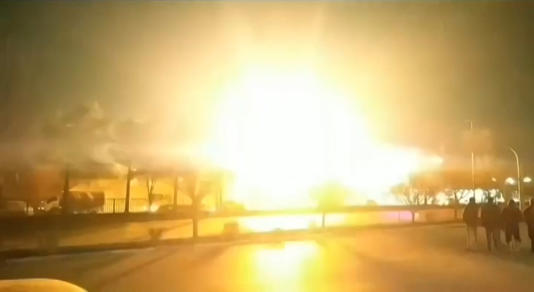
Mystery explosion at Iran military site may affect Shahed drones for Russia, Ukraine media claims
Keep up to Date & Bypass the Big Tech Censorship
Get uncensored news and updates, subscribe to our daily FREE newsletter!
Amunitions factory in the Iranian city of Isfahan was struck by drones over Saturday night, Iran’s Ministry of Defence (MoD) reported, with speculation the site manufactured the drones used by Russia to attack Ukraine.
Several drones were shot down by air defences but the attack caused minor damage to the building, Iran claimed, describing the attack as “unsuccessful.”
“There were no casualties in this incident, but the damage and the…factors that caused this explosion are under investigation,” said a spokesman for the MoD.
| Recommended Books [ see all ] | ||||
|---|---|---|---|---|
 |  |  |  |
 |
Videos circulating on social media showed explosions in Isfahan, purportedly due to the impact of the strike. Several other explosions were reported in locations across the country but not confirmed by Iranian authorities.
Western intelligence sources said the attack was a “phenomenal success” causing significant damage to the site, Israeli newspaper Jerusalem Post reported.
The MoD did not attribute responsibility for the attack. But Iranian commentators pointed to Israel, which is implicated in a covert campaign of sabotage of Iranian military facilities – such as a cyber attack on the Natanz nuclear reactor in 2021 – as well as assassinations inside Iran.
Foreign Minister Hossein Amir-Abdollahian said the attack “comes within the framework of an attempt by Iran’s enemies to destabilise security.”
Israel has a policy of not claiming responsibility for such operations but officials have vowed to thwart Iran’s nuclear programme, which Tehran claims is for civilian purposes. Israel has also admitted targeting Iranian forces in Syria.
Former Prime Minister Naftali Bennett coined the “Octopus doctrine” to describe a programme of combating Iran’s activities inside the country as well as abroad.
Iran is suspected of using drones to strike Israeli-owned oil tankers and fired missiles at what it claimed was an Israeli base in Iraq over the past year as the long-running conflict between the countries has escalated.
Ukrainian media reported that the factory in Isfahan was used to produce the Shaheed suicide drones that Russia has used to attack cities and energy infrastructure in Ukraine.
Ukrainian journalist Yaroslav Trofimov said the strike would be a boost for Kyiv.
“If it was Israel, as everyone seems to believe, and if Iran’s drone and ballistic missile facilities have been seriously damaged, as appears to be the case, that’s worth a hell of a lot more than 14 tanks,” he tweeted – referring to the recent commitment from Western powers to supply advanced tanks to Ukraine.
Ukrainian adviser to President Volodymyr Zelensky, Mikhail Podolyak, tweeted: Explosive night in Iran – drone & missile production, oil refineries.
Open-source investigators disputed the claims and said the suicide drones were produced elsewhere.
Israel has received criticism for its refusal to join Nato countries in sending weapons to Ukraine, which former Defence Minister Benny Gantz attributed to “operational considerations.”
Israel works closely with Russia for operations in Syria, where the Kremlin’s forces are defending the rule of President Bashar al-Assad.
But Israeli officials have alluded to assistance for Ukraine that is not made public.
“We help – albeit behind the scenes – and much more than is known,” said Israel’s ambassador to Germany Ron Prosor on Saturday.
“The Israeli army regularly blocks arms shipments from Iran to Syria and Lebanon. These include Iranian drones and missiles that Russia is using in Ukraine.”
Analyst Hamidreza Azizi of the Dutch think-tank the Clingendael Institute said that an attack on one of Iran’s major cities was bolder than previous strikes in rural areas.
“If (the attack) was from outside it indicates a huge air defence failure and significant intelligence failure,” he said. “If it is Israel behind the attack, we are witnessing a considerable shift in the rules of engagement and a blatant escalation.”
Source: https://tinyl.io/7lfP


